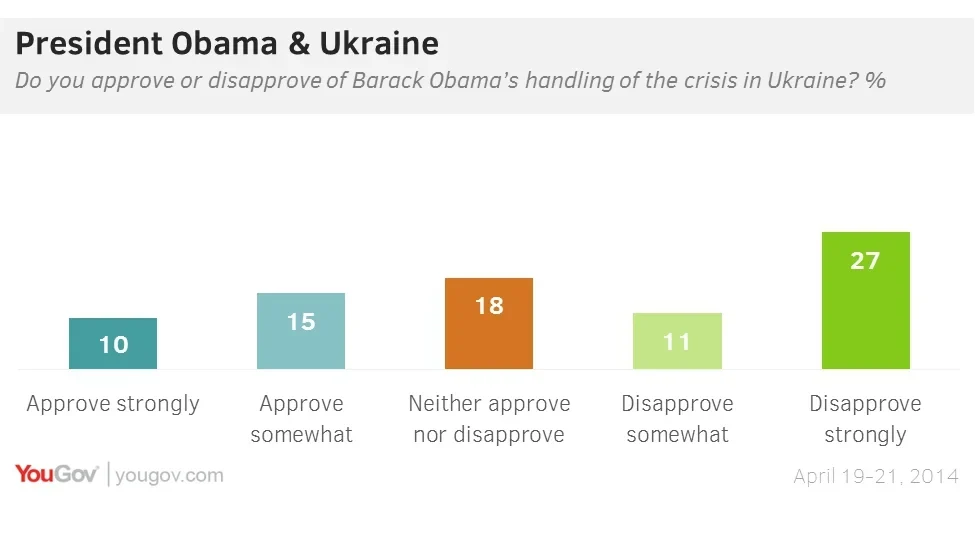Americans don't think that the future for Ukraine is very bright, but few want the US to get involved in the crisis
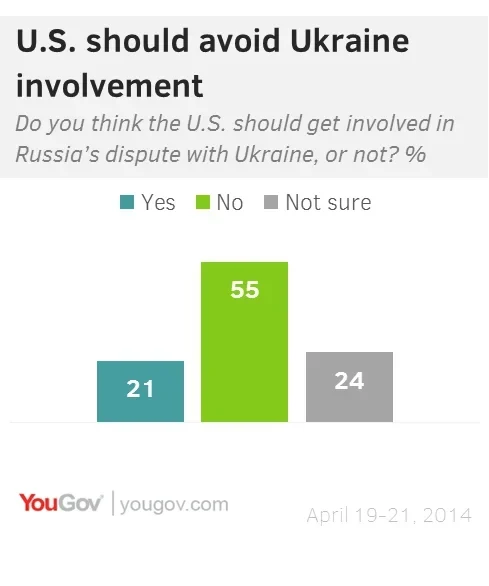
Americans have pulled back from supporting actions in international trouble spots. Last year they opposed the U.S. punishing the Syrian government for using chemical weapons against its own people, and this year they oppose involvement in Ukraine, despite their own dire predictions for the independent, unified future of that country. In the latest Economist/YouGov Poll, only 21% favor the U.S. getting involved in Russia’s dispute with Ukraine.
There is evidence from other recent YouGov Polls that Americans say they would be willing to get involved in some countries, should those countries be threatened. But the list is very small.
Of course, for many Americans the Ukraine conflict is simply not on their radar. Six in ten are following what’s taking place there at least somewhat closely, but only 16% are following it very closely. But even among those following the story very closely, there is little desire for action. Just 39% of those paying very close attention are in favor of U.S. involvement.
However, when given a list of options for U.S. action, a majority of those paying close attention would support economic sanctions, as would 40% of the total adult population. Only a third of those paying close attention support sending military weapons to Ukraine, and only 11% would send U.S. troops.
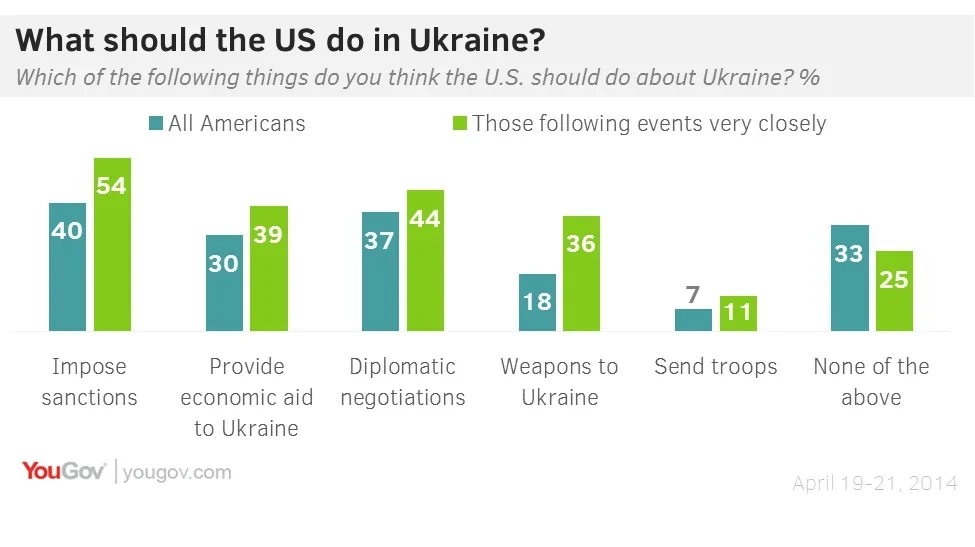
One in three Americans would take none of the above actions.
There is enormous pessimism about the future of a free Ukraine. 56% of Americans expect Russia ultimately will absorb all of Ukraine or at least its eastern part, in addition to the Russian influence in Crimea. More than six in then of those paying close attention agree. 39% believe Ukraine will be a part of Russia as early as next year, more than believe it will remain an independent nation. Of course, given that many Americans aren’t following the situation in Ukraine closely, more than a third aren’t sure.
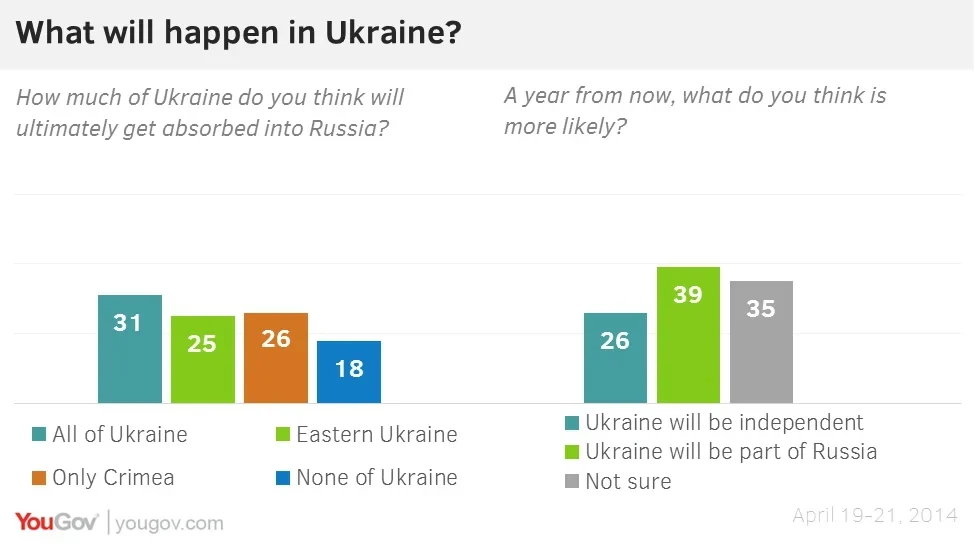
Republicans are especially worried. Half of Republicans think Russia will absorb Ukraine in the next year; just 22% of them think the country will remain independent. More than two-thirds of Republicans say Russia ultimately will absorb all of eastern Ukraine or the entire country. But that doesn’t result in much more Republican support for intervention. Just one in four Republicans favor U.S. involvement, and only 40% even favor economic sanctions on Russia.
Although many expect that Russia will end up controlling much of Ukraine, Americans don’t want this to happen: eight in ten say that the Russian-speaking parts of the country should remain in Ukraine, not join Russia.
The aversion to action in Ukraine – even though Americans want Ukraine to remain in one piece – may be due to the importance Americans place on keeping good relations with Russia. Although most Americans said it was a bad decision to hold the 2014 Winter Olympics in Sochi, Russia, they still wanted American athletes to compete. And although currently they fear for the future of Ukraine, nearly eight in ten say it’s important to maintain friendly relations with Russia today. In fact, maintaining good relations with Russia so it might help the U.S. find solutions in Syria and Iran outweighs any need to punish Russia for its Ukraine aggression.
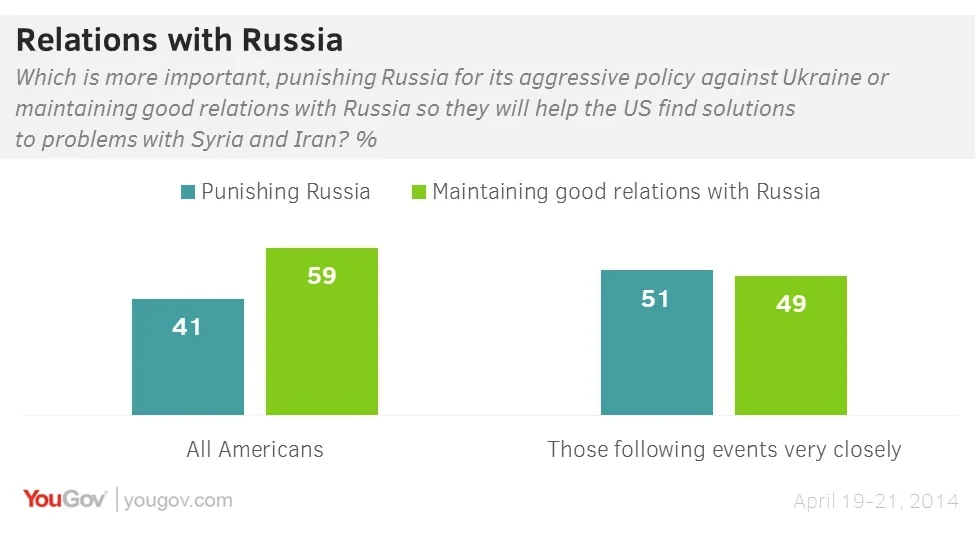
Those paying the most attention are more likely to say punishing Russia is more important, but even they are evenly divided on what matters more. Those who expect Russia to absorb Ukraine are fatalistic: they agree good relations with Russia outweighs punishment for its aggression.
Although the Economist/YouGov poll did not ask specifically how Americans feel about U.S. moving its troops closer to Russia and Ukraine by conducting maneuvers in several Eastern European NATO countries, actual troop involvement in Ukraine gets support from fewer than one in ten Americans. President Obama’s actions concerning Ukraine get little support: by 38% to 25%, Americans disapprove of how he is handling the situation. Disapproval is greater than approval both for those following closely and those not paying any attention at all.
